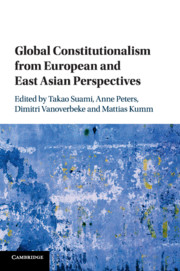Book contents
- Global Constitutionalism from European and East Asian Perspectives
- Global Constitutionalism from European and East Asian Perspectives
- Copyright page
- Contents
- Contributors
- Acknowledgments
- Global Constitutionalism from European and East Asian Perspectives
- Part I Groundwork
- Part II Pursuit of Common Values
- 6 Are We Talking the Same Language?
- 7 Chinese Perspectives on the Rule of Law
- 8 Cosmopolitanising Rights Practice
- Part III Horizontal Interactions
- Part IV Implementation and Enforcement
- Part V Conclusion: East Asia and Global Constitutionalism
- Index
6 - Are We Talking the Same Language?
The Sociohistorical Context of Global Constitutionalism in East Asia as Seen from Japan’s Experiences
from Part II - Pursuit of Common Values
Published online by Cambridge University Press: 09 November 2018
- Global Constitutionalism from European and East Asian Perspectives
- Global Constitutionalism from European and East Asian Perspectives
- Copyright page
- Contents
- Contributors
- Acknowledgments
- Global Constitutionalism from European and East Asian Perspectives
- Part I Groundwork
- Part II Pursuit of Common Values
- 6 Are We Talking the Same Language?
- 7 Chinese Perspectives on the Rule of Law
- 8 Cosmopolitanising Rights Practice
- Part III Horizontal Interactions
- Part IV Implementation and Enforcement
- Part V Conclusion: East Asia and Global Constitutionalism
- Index
Summary
- Type
- Chapter
- Information
- Publisher: Cambridge University PressPrint publication year: 2018



